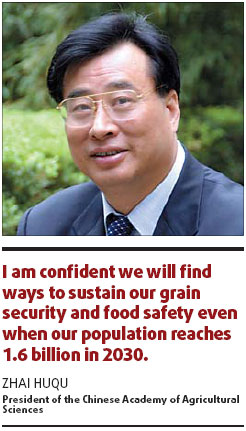Agriculture chief has thought for food and plenty on his plate

Some 10 hectares of wheat and corn grow robustly between the skyscrapers and the northern third-ring road in Beijing.
To Zhai Huqu, a commander of an empire consisting of nearly 10,000 agriculture-related scientists across China, those are battlefields.
Zhai, 57 and head of the world's biggest agricultural research organization, has two goals in mind: One is to ensure China's grain security and the other is to help find better ways to fight hunger in underdeveloped countries.
To realize his goals, Zhai said that he has several cards in hand: hybrid rice, high-yield wheat, corn and cotton. The technological breakthroughs achieved by pools of scientists have answered the question, "who feeds China?", with its population of 1.3 billion.
Now, in addition to sustaining the big population's basic needs in clothing and food, Zhai believes China, as a growing economic power in the world, could shoulder more responsibility to help feed the hungry people of the world by exporting high-yield technologies .
Zhai, one of 2,000-plus delegates of the 17th CPC National Congress starting today, said China has played a leading role in rice, wheat, corn and soybean research. Currently, average yields of some crops in African countries are only one third to one fifth of those in China.
"Our technological advances are there and we are confident more will happen," said Zhai, president of the Chinese Academy of Agricultural Sciences, in an exclusive interview with China Daily. "The most imperative is to put them in use both in China and other developing countries."
Poverty is partly rooted in low agricultural productivity, and as a result, people do not have enough to eat, said Zhai, an alternative member of the 16th Central Committee of CPC. The committee is the Party's leadership, which consists of about 400 members.
"China could contribute more to the development of Africa's agriculture and those efforts are very much needed," Zhai said.
This summer, China launched a $5 billion fund to finance investment in Africa. The lion's share of the fund will be used to provide African countries advanced technologies, quality fertilizers and seeds, in addition to offering other expertise. "I hope the efforts could help generate a 'green revolution' on the continent," Zhai said.
Despite the progress China has made in feeding and clothing its people, the agricultural picture is not always rosy. "We have many concerns," Zhai said.
Zhai's concerns include the shrinking of arable land, the impact of climate change on agriculture, plant and animal diseases prevention and food safety. He said these challenges are now high on his academy's research agenda.
As a result of rapid urbanization, China has already hit a bottom-line of 12 million hectares of arable land, which it planned to reach by 2010. And growing disastrous weather brought by global warming has threatened the harvest of crops in recent years.
Meanwhile, the country is still facing grave challenges in pesticide use as it sprays 1.45 million tons of pesticide annually - a large amount for killing insects and nearly two-thirds flow into rivers, the soil or farmland.
Earlier, China's economic planner the National Development and Reform Commission warned the use of pesticide, coupled with industrial pollution, should arouse grave concerns about food safety.
"The challenges are the impetus for research and scientific breakthroughs and I am confident we will find ways to sustain our grain security and food safety even when our population reaches 1.6 billion in 2030," Zhai said.
In addition to the expanded planting of hybrid rice, China plans to sow 33.5 million hectares of super-high-yield wheat by 2020, which could help increase harvests by 30 percent. It is expected that wheat harvests in main demonstration areas could hit 10.45 tons per hectare. The national average annual yield was 4.25 tons in 2004.
Zhai also said the country should bolster its research and application of biotechnology and encourage scientists to make breakthroughs and apply for patents, mainly in agriculture and health areas, to make China a powerhouse of international biotechnology within 15 years.
"We are still behind the United States by five to 10 years in terms of overall research and development capacity," he said.
Zhai said his confidence stems from pools of scientists and researchers. He said he has spent most of his time seeking talent since he become president of the agricultural academy. "Top-level scientists in my academy are the most valuable property," Zhai said.
"They each had $5 million yuan in initial funds to explore their arenas."
In addition to the funding, the academy has helped them to set up research teams. More than 40 world-class scientists are working on rice, wheat, cotton, animal disease prevention and other sectors, Zhai said.
"The achievements will benefit our people and the rest of the world," he added.
(China Daily 10/15/2007 page17)














